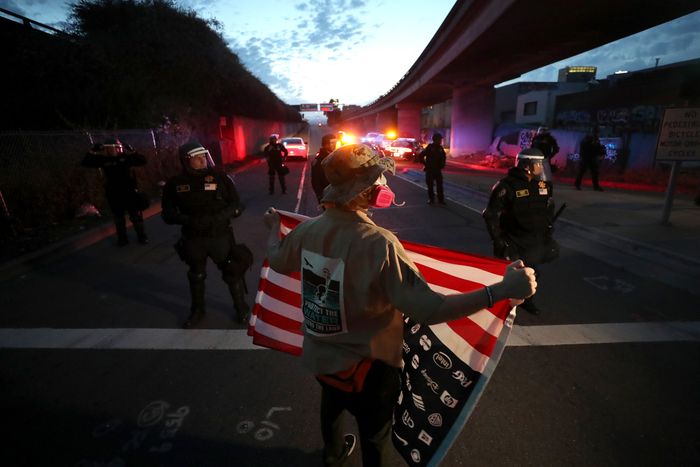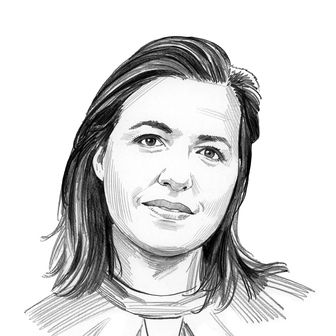
In recent days, bitterness has set in among conservatives who believe a political double standard is at work. The same politicians and public-health officials who called for coronavirus shutdowns in the early spring, they complain, have now rubber-stamped the anti-racist protests across the nation. “The people who told us and scolded us (including public health experts), who told us there was literally no reason that would justify ignoring them or violating social distancing rules suddenly find that literally no reason means ‘unless it’s a reason that’s societally important,’” wrote TheBlaze’s Leon Wolf in a widely shared Twitter thread that linked his fury to the inability to visit a friend with COVID-19 in a hospital. Hillbilly Elegy author JD Vance, blithely mischaracterizing who is out on the streets, commented, “I’m still amazed at how quickly the moral scolding ceased as soon as elite-favored protests began taking place.”
Many contrasted the ability of people to protest the police killing of George Floyd and others with restrictions on church services; law professor David Bernstein wrote, “For many of the left, anti-racism is basically a religion, and they don’t want the Covid crisis to interfere with an important anti-racism ritual, protest. But when it comes to accommodating actual religion, like having a religious quorum at a funeral? Feh, that’s not important.” Much, too, has been made of the fact that public-health professionals and doctors were among the signatories to an open letter that says that “protests against systemic racism, which fosters the disproportionate burden of COVID-19 on Black communities and also perpetuates police violence, must be supported.”
It’s true that the nightly sight of protesting crowds is an abrupt turnaround from the crowded pool parties that earned wide opprobrium on social media. But none of these, not even church services, are the right comparison points for the constitutionally protected right to assemble in protest. As studies have mounted showing that the virus is less efficiently transmitted outdoors but that indoor spaces where people sing or shout can be deadly, even Supreme Court Chief Justice John Roberts was persuaded last week over his fellow conservatives’ dissent that public health justified limiting church capacity — not shutting them down — despite their religious-freedom rights. And government officials have in fact been pretty deferential to religious gatherings — even in supposedly godless New York, Andrew Cuomo was sued by the New York Civil Liberties Union because at first only religious organizations were allowed to gather in small groups. As for hospital visitation rules, they have a public-health justification too, dating back to massive shortages in protective equipment and testing; in New York and elsewhere, they are slowly being lifted.
Instead, contrast the treatment of these protests with the largely white, often armed demonstrations opposing coronavirus shutdowns that flared up outside statehouses throughout the spring. Unlike those protests from the right, the Black Lives Matter actions are being heavily restricted by the state in ways that aren’t separate from the coronavirus rules but legally derive from them. The irony is that even amid the uncertainty that still exists around COVID-19, what we do know is that the enforcement of those rules — mainly curfews and police crackdowns — are the likeliest to spread the virus.
Take the curfew in New York City, which throughout the spring has been the epicenter of the coronavirus. Read Mayor Bill de Blasio’s emergency order declaring it and you’ll see that it refers back to the emergency declaration from March 12, first acknowledging that “large gatherings increase the potential for spread of the virus” and only then going on to cite “violent acts … happening primarily during the hours of darkness” to shut down New York at 8 p.m. It turns out that layering the two sets of restrictions on public gatherings and movement functions as a kind of legal Jenga, with interlocking justifications rising ever higher and more precariously.
“It’s very hard, legally, to challenge emergency orders based on public-health laws,” said Angelo Guisado, staff attorney at the Center for Constitutional Rights. A court that’s reluctant to limit First Amendment–protected activities like free speech and assembly would be far more sympathetic to arguments that public health is at risk.
It might sound good to a hypothetical judge, but in practice, enforcing the curfew has created a massive public-health contradiction by enabling criminalization. After data showed that 80 percent of summonses for violating social distancing were issued to black and Latino New Yorkers in the first five weeks of the pandemic, de Blasio backed off on the police enforcing social-distancing. But Guisado pointed out that the curfew order explicitly puts police back in the enforcement game by making violations of it a Class B misdemeanor. “They’re criminalizing protesting under the guise of public health or public safety,” he said.
Days into the curfew’s enforcement in New York City, a sickening pattern has been set: Peaceful protest of police brutality alongside scattered looting, followed by escalating police violence, ostensibly for violating the curfew. On May 30, the New York City Department of Health tweeted guidelines on safe protesting, including face coverings and keeping a distance, but the NYPD has had other ideas.
On Tuesday night, the Legal Aid Society filed a suit on behalf of over 100 protesters who they said were being held in violation of new laws that require that defendants be held no more than 24 hours before being arraigned. Those detainees, said the public defenders, were being “needlessly subjected to increased risk of contracting COVID-19, endangering each of them as well as the entire community.” Even before the curfew, arrests at the protests threatened to undo any virus-related precautions. One person being held by police told The City on Friday night, “Nobody was wearing masks inside One Police Plaza. So that was super-dangerous.” As massive outbreaks in jails have already indicated, it is undisputed that the coronavirus spreads most easily in enclosed spaces with low air flow, where it is impossible to distance.
Indeed, the letter from public-health experts that so infuriated the right explicitly warned against this. It recommends that protesters not be arrested “or held in confined spaces, including jails or police vans, which are some of the highest-risk areas for COVID-19 transmission,” and points out that tear gas “could increase risk for COVID-19 by making the respiratory tract more susceptible to infection, exacerbating existing inflammation, and inducing coughing.”
Vera Eidelman, a staff attorney with the ACLU’s Speech, Privacy, and Technology Project, said she could find no precedent for a curfew for protests being layered on a public-health emergency. “If public health is the motivating concern, it doesn’t make sense to respond with kettling or blockading,” she said. “It doesn’t make sense to expose protesters to tear gas or other weapons that public-health experts are saying only increase the chance of COVID-19 spread.”
But rather than focus their outrage on this particular government overreach, specifically how crackdowns themselves help spread the coronavirus, some conservatives — most visibly, Senator Tom Cotton — are instead demanding an even more sweeping military crackdown on protesters, the kind of coordinated federal and state response that even months into the pandemic, we have yet to see mobilized for the virus.
Tragically, we learned Wednesday night that Floyd had survived the coronavirus, for which he tested positive in April, only to die at the knee of a police officer. That both scourges fell on a black man is not a coincidence. That overlap of human rights abuse and health disaster has not been lost on the protesters in the streets.






























